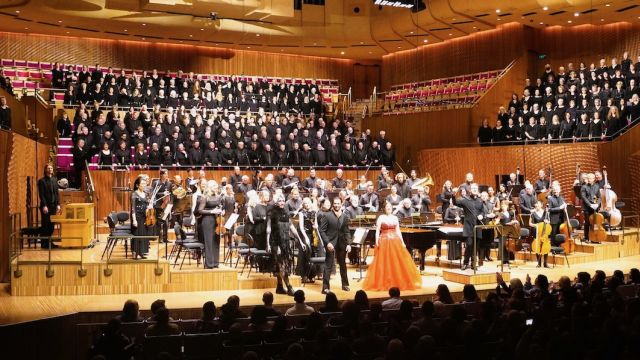Carmina Burana
It’s a sunny spring Saturday afternoon in Sydney! The harbour is sparkling, the city bustling. Crowds chat and stroll or snap photographs on the forecourt of the Opera House.
Inside The House, in the Concert Hall, over 400 singers fill the balconies behind and above 74 musicians on the stage. And an audience of over 2,000 wait expectantly for conductor Brett Weymark to enter and introduce yet another exceptional performance by the Sydney Philharmonia Choirs and Parramatta’s River City Voices.
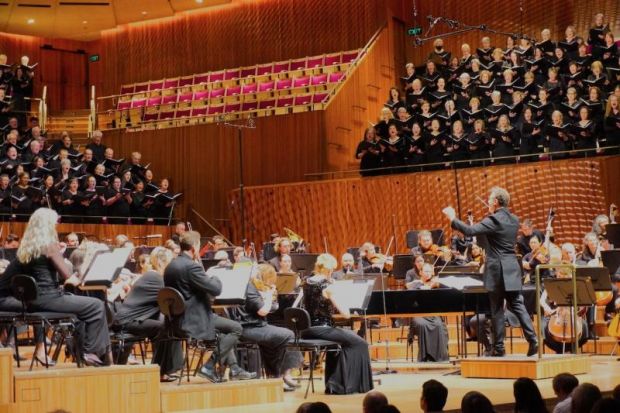
When he does, Weymark brings with him composer James Henry and pianist librettist Tamara-Anna Cislowska. Because this performance of Carl Orff’s Carmina Burana will be preceded by premiere performances of two brand new compositions that celebrate the ancient and emerging cultures of Australia.
James Henry introduces his new composition Murrgumurrgu – in which he describes how the ibis was peaceful and happy in its home in Narran until it had to search further afield for food and water when its habitat was cleared.
Tamara-Anna Cislowska describes the origin of her collaboration with Elena Kats-Chernin to write Human Waves, inspired by tales they discovered through research and interviews with migrants and their families, people who, in Weymark’s words, “have shaped our nation”.
So the audience was in for a triple musical experience, which as is usual, began with the performance of Tarimi Nulay (Long Time Living here) the acknowledgement of country composed by Deborah Cheetham and Matthew Doyle.
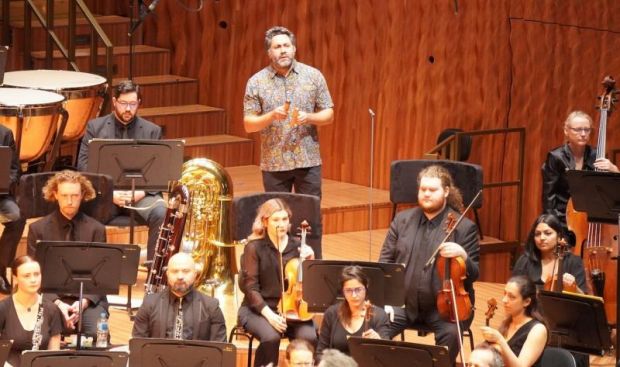
A moment of silence was broken by James Henry who, to the sound of clapping sticks, led the orchestra and choirs in the performance, in Yuwaalaraay language, of his gentle, peaceful tribute to the long legged, curved beak, white and black bird that has been hunted from its natural habitat to our city parks and schoolyards.
Tamara-Anna Cislowska then took her place at the piano for Human Waves, but not before Brett Weymark “face timed” Elena Kats-Chernin in Europe so she could hear and watch the premiere performance of their composition. A lovely gesture – and so typical of Weymark!
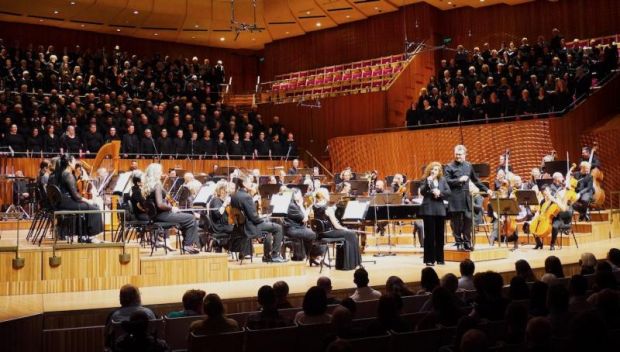
Human Waves tells in appropriate cultural music, nine stories, beginning and ending with Citizen, based on the Australian pledge of citizenship that is dear to the hearts of so many ‘new’ Australian citizens.
To and Fro and To tells of a Vietnamese family’s journey to Australia through the eyes of an eight-year-old boy:
“… no one can make a sound on this holiday.
If someone hears they’ll chase us down.”

Tong Yun Gai is the story of Yen Pein, who was born in Melbourne at end of the 19th century and grew up in Little Bourke Street’s Chinatown.
Ode to the salty Paste honours the “mysterious charm” of Vegemite:
“Dark brown goodness with B1, 2, 3 …
Guilt free, healthy,
It’s vegan, kosher and halal.”
Continent of Light beautifully describes in words and music the “vastness and diversity” of
The landscape that is so different, especially to immigrants coming from Europe:
“Spaces above.
Look up in awe.
Endless blue.”
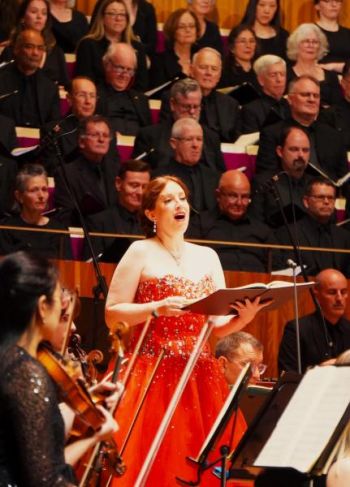 A short interval, and the choirs and the orchestra returned, along with youngsters from the NSW Public Schools Junior Singers, and baritone Hadleigh Adams and soprano Lorina Gore for Carl Orff’s beautiful, thrilling Carmina Burana. Well-known to so many – often simply because of its use in the soundtracks of movies – this sometimes rousing, sometimes erotic, sometimes satirical, always exciting composition gives singers and musicians the opportunity to be part of an ensemble that pays homage to fortune, spring, nature, travel, indulgence, beauty and love.
A short interval, and the choirs and the orchestra returned, along with youngsters from the NSW Public Schools Junior Singers, and baritone Hadleigh Adams and soprano Lorina Gore for Carl Orff’s beautiful, thrilling Carmina Burana. Well-known to so many – often simply because of its use in the soundtracks of movies – this sometimes rousing, sometimes erotic, sometimes satirical, always exciting composition gives singers and musicians the opportunity to be part of an ensemble that pays homage to fortune, spring, nature, travel, indulgence, beauty and love.
From the reverberating introduction of “O Fortuna” to the final notes of “hail, rose of the world; Blanziflor and Helena, noble Venus” the Concert Hall is filled with the music inspired when Orff found an 1847 edition of the Carmina Burana, a mediaeval anthology of 24 poems in old Latin, middle High German and French lyrics.
“On opening it,” he wrote, “I immediately found, on the front page, the long famous picture of ‘Fortune and her wheel’ and under it the lines O fortuna/ velut luna/statu variabilis … Picture and words seized hold of me … a new work … a stage work with singing and dancing choruses … at once came into my mind.”
So his own Carmina Burana was born. Since it was first performed in Frankfurt in 1937, it has been transporting audiences all over the world – just as Brett Weymark, concertmaster Fiona Zeigler, the orchestra, and the singers of the Sydney Philharmonia Choirs transported their delighted audience 86 years later … on a sunny spring Saturday in Sydney in 2023.
Carol Wimmer
Photographer: Simon Crossley-Meates
Subscribe to our E-Newsletter, buy our latest print edition or find a Performing Arts book at Book Nook.

